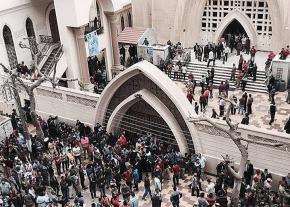Complicit in the crimes against the Copts
Two explosions in Coptic Christian churches in the Egyptian cities of Tanta and Alexandria, claimed at least 44 lives and left dozens injured. The churches were packed with worshippers for Palm Sunday services.
The bombings were claimed by the Islamic State in Iraq and Syria (ISIS) and are the latest in a long list of atrocities directed at the Coptic minority in Egypt. President Abdul-Fattah el-Sisi has promised to defend Copts against sectarian violence, but his regime--the former dictator Hosni Mubarak before him--tolerates the bloodshed and exploits the sectarian divide to maintain power. The Egyptian Revolution of 2011 brought a glimpse of the possibility of unity between Muslims and Copts in the struggle against the dictatorship, but that spirit of solidarity was undermined during the presidency of Mohamed Morsi of the Muslim Brotherhood and then destroyed by Sisi and the coup-makers who toppled Morsi.
Here, the issue their statement on the horrific bombings and explain the background to the violence and the forces that benefit from it.
YET ANOTHER bloody holiday for the Copts of Egypt. Once again churches are bombed and dozens of churchgoers are killed on a religious holiday. Once again the corpses of Copts lie with the debris of their icons and what is left of their churches. Once again, al-Sisi's regime, its military rule and its police state fail to protect Coptic lives and churches.
Al-Sisi took power promising the Copts of Egypt that the days of fear, terror and sectarian violence were gone, and his regime would protect them from dark terrorism. Here we are in the fourth year since the coup, the third year of Sisi's presidency, and the last four months alone saw the bombing of the Peter and Paul church, the killings and displacements of Christians in Arish and the two latest massacres in Tanta and Alexandria.
When a terrorist was allowed to go inside the Peter and Paul church and blow it up, the Coptic youth raged at the flagrant security failings and demanded the sacking of the interior minister. But al-Sisi intervened to prevent any talk of failings and naturally did not sack his interior minister. And now terrorists were able to attack a church barely a week after a bomb was discovered outside that same church! Here the security failings and the lack of accountability have become complicity with the crime.

We must remember that the few weeks before the January 2011 revolution saw large demonstrations of Coptic youths against the burning and bombing of their churches and the complicity of the security services. One sign of the political bankruptcy of the Mubarak regime was the abhorrent sectarian "deal" that counted on the Coptic Church to support the regime and contain the anger of Copts while giving free reign to the sectarian agitation of al-Azhar and the Salafists. Mubarak's state was a particularly sectarian one, and al-Sisi's state is based on the same sectarian principle.
The January 2011 revolution shattered this sectarian "deal" and saw, for the very first time in modern Egyptian history, unity between the Christian and Muslim masses, not around hollow nationalist slogans like "Religion is for God and the Nation is for everyone," or police-sponsored superficial alliances between the Coptic and Muslim religious leaders, but around a common revolutionary struggle for democracy, freedom and social justice.
But this unique revolutionary moment did not last long. The Muslim Brotherhood betrayed the revolution by siding with the Military Council (SCAF), which exploited sectarianism and inflamed it with the Maspero massacre. The secular opposition has also allied itself with the military to get rid of the Muslim Brotherhood, paving the way for al-Sisi's 2013 coup.
Al-Sisi restored the bases of the Egyptian sectarian state and re-established the very sectarian and securitarian deals that Mubarak's regime had set up; the Copts are once again paying the price with their blood. The security services' incompetence and complicity are only part of the picture, and we must of course join the Coptic youths when they demand that the interior minister be sacked and put on trial for criminal negligence.
BUT THE security failings are part and parcel of the political bankruptcy of the al-Sisi regime. Not only did the military rule and its security forces fail to protect the Copts and their churches, but this regime's policies can only lead to more violence, bloodshed, terrorism and sectarianism. A regime that is based on tyranny, dictatorship and the suffocation of the political arena. A regime whose economic policies impoverish the majority for the sake of the same big businessmen who monopolized the country's wealth in the Mubarak years and shared it with the generals. A regime that is based on sectarianism and uses the religious institutions, from the Coptic Church to al-Azhar Mosque, to gather support for the dictatorship. A regime that hasn't made a single step to dismantle the systemic discrimination and persecution that the Coptic masses suffer, but on the contrary reinforces the discrimination and persecution, exploiting the sectarian card along with tyranny and repression in order to remain in power.
Once more, al-Sisi and the al-Azhar Imam will present their condolences to Pope Tawadros. And once more, they will talk of national unity and the evil plots against Egypt and other nonsense.
It is about time that we built an opposition that rejects all forms of sectarianism, be it coming from al-Sisi's regime or groupings of political Islam. An opposition that doesn't content itself with condemning terrorism and the terrorists and the failings and complicity of the security forces. An opposition that puts the struggle against sectarianism and the persecution of Copts at the center of its priorities.
Glory to the martyrs
We won't forget al-Qaddisayn
We won't forget Maspero
We won't forget Peter and Paul
We won't forget Arish
We won't forget the Palm Sunday massacres
First published at the Revolutionary Socialists website.


